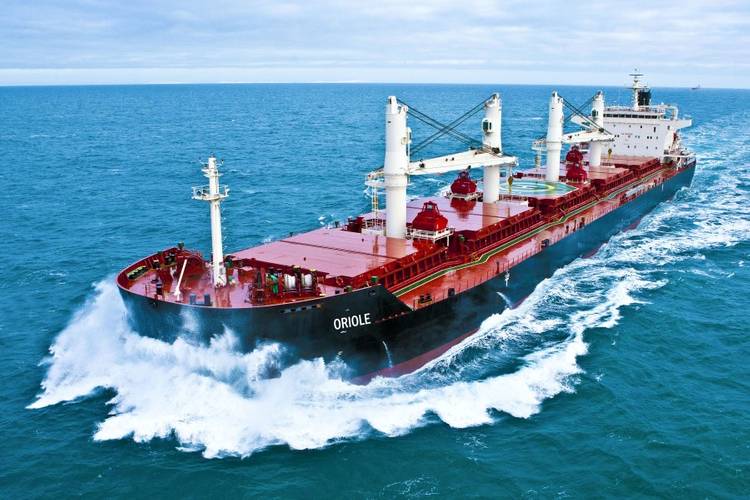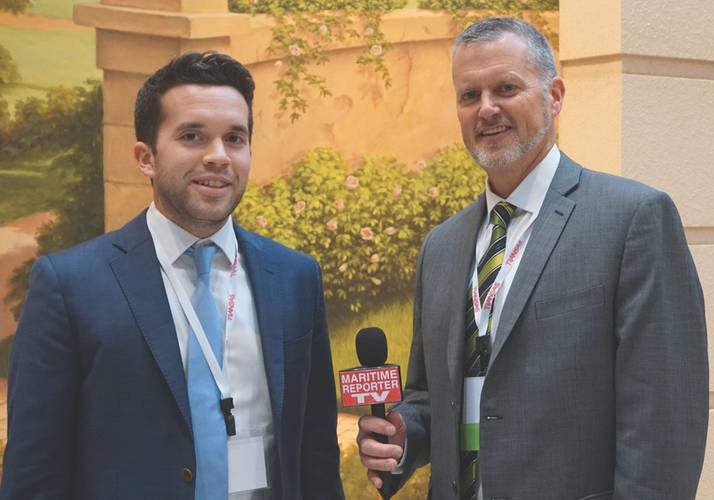It may come as some surprise, but Eagle Bulk Shippng is a progressive leader in the use of big data to monitor and manage its fleet. Jonathan Dowsett, Senior Fleet Performance Manager, explains in a recent interview with Maritime Reporter TV.
For our readers not familiar, who is Eagle Bulk Shipping?
Eagle Bulk Shipping Inc. is a US based owner and operator of 40 Supramax size bulk carriers. Both commercial and technical management is handled in-house. We are the third largest owner of Supramax bulk carriers in the world.
And as Senior Fleet Performance Manager, what precisely is your job?
My job is to look at all kinds of data and to leverage that data into intelligence for Eagle, to help make better decisions more often. We are optimizing everything, from routing, to the type of anti-fouling paint we put on the hull, to when we dry dock our ships. You name it … if we can collect relevant data we can try to model the decision space and use data to reach a decision rather than a feeling or convention. My job is very much about using data to make decisions.
The current conundrum we see is too much data. What do you do with the data once you have it?
Onboard our ships we are collecting information on everything from ship speed to weather to fuel consumption. We can even look at more detailed things like specific pressures in specific cylinders on the main engine. All this data is sent shore-side regularly; once it’s shore-side, we are combining it with other datasets like hindcast weather data and pulling it through many different models… models for optimal fuel consumption at a specific speed, draft, and weather conditions, for example. This allows us to compare the fuel consumption we expect from the ship against what the ship is telling us it’s consuming.
So how is that information ‘actionable?’
In that example, when you have a difference in fuel consumption, you immediately have actionable information and can start to dig into the underlying data to determine where the difference stems from.
So how does your operation look on the shore side of things?
On the office side we have operators who are giving speed instructions to the ships. In the past it would be one speed or another, but by leveraging the data we’re receiving from the ship and combining it with voyage specific financial data, it becomes clear that there are a full range of speed instructions and a specific speed instruction that optimizes the outcome of the voyage. This is getting very detailed, but if you do this enough times with enough parameters, you have these little savings that can add up into a very large impact fleet wide over the course of a year.
As I’m sure you can attest, times are tough for many sectors in shipping at the moment. How do you see this approach as beneficial to your business?
Yes, it is a bad time for bulk carriers and bulk operators, so you need to differentiate yourself. A critical way to do this is to embrace business intelligence. This is the way the industry is going. If you’re not going to embrace business intelligence and performance management then you will be left by the wayside. You will lack the intelligence that others have. The Containership and Cruise ship sectors embraced this 5-10 years ago, and they really have seen the light. I don’t think there is a single one of those owners that is not doing this.
From your experience, what do you see as potential impediments to adoption of “Big Data?
Now this has cascaded to where tanker owners and bulk owners are doing it. It is tremendous change. Shipping is very conservative, emotionally driven, with people operating as they always have, and now you have to embrace this new technology and this new approach which suggests that perhaps you shouldn’t simply conduct your operations as you always have: the data shows you should do this, or a model shows that you can make a little more money by doing it this way.
I think the people and the companies that are not willing to adopt this approach run the risk of falling far behind and being left by the wayside.
There is much talk on big data, connectivity, the Internet of Things and autonomous operations. When you look down the road, what do you see?
I think you already hear a lot about big data and autonomous ships, but I won’t go that far. Instead I’m more interested in the short term extrapolation of where we are going. Instead of having the crew onboard send in data once every 24 hours, you’re going to see it coming in multiple times per second. We’re going to be able to make corrective actions in real time. Instead of having a ship operating at a sub-optimal speed or a sub-optimal trim for a week, it’ll be two minutes and the office will realize this is something we could improve. It will go back to the crew almost immediately so that the crew is seeing it in real time. So I think you’re going to see a much shortened time horizon from the time it takes to leverage data into good decision making. Going beyond that, you’re going to have so much data coming in and so many models to pull it apart that we’re going to have insights into operational and technical inefficiencies that we don’t even know about today. All of this information moving in real time between ship and shore is also going to open up exciting predictive capabilities so that continuous improvement will move from being reactive to proactive.
Jonathan Dowsett is a graduate of Webb Institute with a Bachelors - Naval Architecture and Marine Engineering and the University of Cambridge with a Masters - Engineering for Sustainability. Previously he was with Maersk in Copenhagen.


















